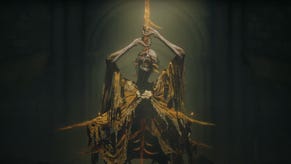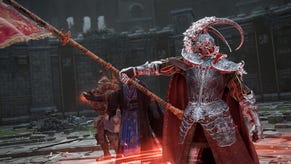Inside the Dark Souls PvP community existing in Elden Ring's shadow
On the brink of Elden Ring’s release, we explore the past, present and future of Soulsborne PvP
Over five years after release, it still takes mere seconds to join a fight club in Dark Souls 3. Playing on PS4, I leave my summoning sign on the moonlit ground of Irithyll, before the telltale message begins to thrum across the screen silently: “Being summoned to another world as phantom”. I find a familiar sight waiting for me, mostly unchanged from my time trekking through the original Dark Souls: a host standing court, throwing bombs into the center of a large, circular arena to indicate the start of a duel between two red phantoms. Other players wait in the wings, sitting comfortably at the edge of a raised platform (or, occasionally, bashing each other with shields).
A tense exchange begins between the two combatants, feeling out the spacing between each other with weapon swings. Most players favour swords or daggers, aggressively rushing opponents down, but a decent number come bearing experimental arms: halberds, greatswords, pyromantic flames. It’s a deadly, intricate dance as the players bob and weave around each other, with small mistakes punished harshly. Eventually it’s my turn, stepping forward into the arena and silently bowing before my opponent. Shield raised, lightning-infused swordspear at the ready, I charge forward. And die. Spat back out at my bonfire, exhilarated, I shake myself off. After playing the fight back in my head, trying to work out my mistakes, I take a deep breath and dive right back in. Each fight, you learn a little bit more, and get drawn a little further into this fascinating competitive ecosystem.
The Soulsborne series is well-touted for its invasion mechanics, but more traditional competitive PvP is relatively unknown outside of its dedicated community. However, to learn more about its intricacies, its appeal and the players carrying its torch forward into Elden Ring, you need to go back to the source.
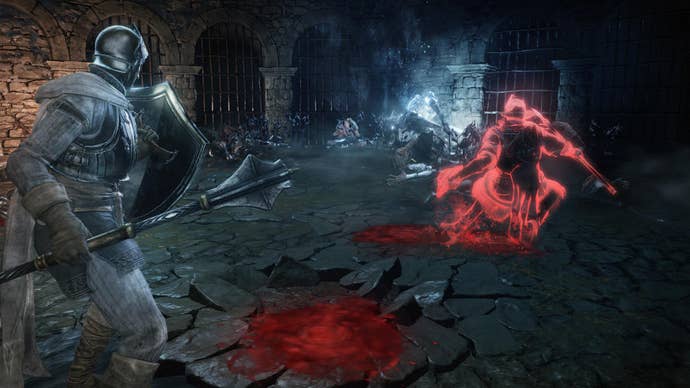
FromSoftware’s action RPG classic Demons’ Souls was helmed by Armored Core veteran Hidetaka Miyazaki and released in 2009. Much of the series’ multiplayer DNA can be found here, like summoning signs allowing you to draw phantoms into your world for jolly co-operation or a duel to the death. Invasions, meanwhile, allowed players to breach each others’ worlds at any given moment, appearing at random throughout the levels of ‘human form’ hosts to throw a spanner into FromSoftware’s clockwork level design. All of which takes place without players being able to directly communicate in-game, bar using cryptic messages and mute gestures. For Miyazaki, this idiosyncratic setup owes its origins to a carjam on a snowy hillside, when drivers began to push each other up the hill to get home.
“I wondered whether the last person in the line had made it home, and thought that I would probably never meet the people who had helped me,” he explained in a 2010 Eurogamer interview, describing the encounter as a “connection of mutual assistance between transient people”.
Gabri is one of the developers of the Dark Souls 3 PvP overhaul mod Champion’s Ashes, as well as the creator of the Elden Ring PvP Discord server, which is aiming to organise competitive play ahead of the release of FromSoftware’s open-world game on February 25. He got started with Demons’ Souls on the PS3 and was hooked by the game’s weighty and polished gameplay, but got drawn into its multiplayer elements. “What really made it stick in your head [was] when you start seeing these ghosts around you, those other players,” he says. “It’s those things that made it stick to this day: there is just nothing, no game that played like it.”
Demons’ Souls was launched without a traditional competitive mode, leaving the community to do it themselves. This led to a relatively low level cap being agreed upon for PvP, forcing builds to prioritise and diversify, as well as a “no Estus” rule, referring to the game’s healing potions. “Over time most people adopted these features and it became the norm for that aspect of the game,” Gabri explains. “It didn't need a mode to let you do duels, we created our own duel mode organically.” From Dark Souls onwards, the games themselves have contained integrated duelling arenas, although competitive PvP has primarily revolved around player-driven duels and fight clubs.
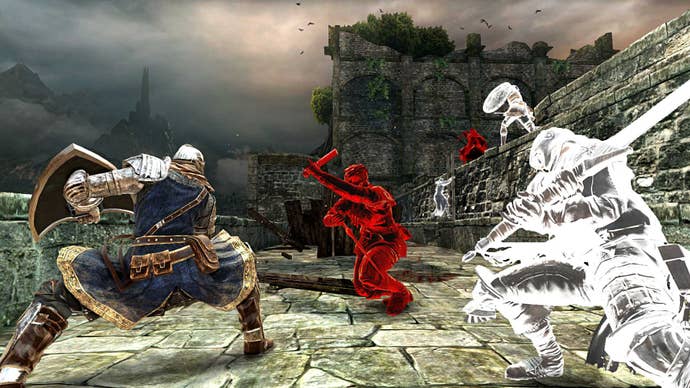
It wasn’t until Dark Souls 2 that Gabri began to seriously dig deep into PvP. Prior games had a high focus on the ‘backstab’ mechanic, whereby players could instantly land a critical hit on other players by attacking directly behind them. Combined with balance issues – alongside the series’ notoriously poor connectivity – this led to larger, slower weapons being heavily unfavoured against quicker options like straight swords, with players being able to dodge through long-winded animations or rush opponents down with a flurry of quick attacks known as ‘R1 spamming’.
Dark Souls 2 nerfed backstabs, adding a grab animation beforehand to make them harder to pull off. “That was a big, big deal in improving variety, because now you can actually use slow weapons and not be scared to get backstabbed,” Gabri says, also crediting the inclusion of two additional ring slots and a larger pool of spells with improving build diversity.
New wrinkles were added to gameplay like dual-wielding attacks unlocked via ‘power stances’, offhand weapons having access to their full movesets, and running attacks stunning players more easily to act as gap-closers. While laggy gameplay and an overall favouring of light, fast weapons was still the order of the day, Dark Souls 2 facilitated an PvP ecosystem which allowed ‘off-meta’ weapons to have their moments in the spotlight.
And then there were three. The release of Dark Souls 3 in 2016 marked the trilogy's finale, shifting the boundaries of PvP in the meantime. Gabri praises certain innovations brought to the table, such as chargeable heavy attacks and the ‘Weapon Arts’ mechanic, while critiquing certain aspects of its combat compared to its predecessor: running attacks dealt less stun, for example, favouring standing attacks and prompting a passive playstyle focused on backpedalling. However, he feels the overall improvement in animation quality makes it hard to go back to Dark Souls 2. “It’s night-and-day in terms of fluidity and movement,” he explains. “The fact that the animations were so much better, it trumps the mechanics that Dark Souls 2 has.”
YouTuber and streamer Jeenine got interested in the Dark Souls 3 competitive scene through tournaments organised by Scott Jund, having a competitive gaming background in Rainbow Six Vegas 2 and For Honor. “In 2016, there was a small community that had already been formed with the previous Souls games and they were ready to jump to create this more competitive tournament setting,” he says.
As an outsider, Jeenine started connecting with other players through YouTube and Twitch, gaining access to fight clubs and PvP-focused Discord servers. “There was a lot of community-organised tournaments that happened after that throughout the years and the community slowly developed around that,” he says, noting that the players themselves would donate to generate prize pools of up to $1000. “It started to get a bit more competitive every time: players were discovering new ‘try-hard’ tricks.”
The fundamentals of Dark Souls’ combat are relatively straight-forward. Weapons have light and heavy attacks which can be modified by running, jumping and rolling, with abilities, spells and items adding more variety. However, players have discovered a wealth of micro-mechanics in this framework over the years, adding layers of depth to competitive play. One example is weapon swapping, where players fly through menus to near-instantly change their equipment mid-fight.
Or there’s extended combos. YouTuber and Elden Ring PVP Discord admin Amir walks us through this tactic in exhaustive detail, explaining how regular light attacks stun players for a two-hit combo before giving them an opportunity to escape with a dodge roll. Amir simulates landing one hit with the Old Wolf Curved Sword, a huge bladed weapon, before pausing slightly, anticipating an opponent’s panicked escape attempt. With careful timing, he launches into the weapon’s special ability, a dramatic sweeping strike which - when timed right - can set up a three-hit combination.
“They really put effort into making the PvP side of things intuitive and consistent, along with making the movement feel way more responsive and smooth than previous games, allowing for much more skill depth when it came to concepts like spacing,” he says. “It feels like what a 3d fighting game should be.”
For Jeenine the appeal of PvP is rooted in the fundamental fun-factor of the Souls games themselves: a heavily customisable third-person action RPG with combat reminiscent of fighting games. “I think it’s unique in that regard, where it mixes this very tight combat and different ways of fighting with this RPG [system],” he says. “There’s no doubt that the Souls games in general - not just Dark Souls 3, but all of them - I don’t think any of them were meant to be pushed this far competitively, PvP-wise. It’s the sort of thing that emerged over time: the community figured out ways to fight that required more skill than the game intended.”
Although some competitive players do remain loyal to older games in FromSoftware’s back catalogue, Jeenine says the majority focus on Dark Souls 3. While the ‘meta’ still primarily revolves around a relatively small pool of quick, bladed weapons, Jeenine has wielded unusual weapons to great effect in the past, such as using a greatlance to help win a $600 PS4 competition in 2018. While Jeenine acknowledges the difficulty of balancing this weapon pool, he feels that this is the wrong way to look at things. “You want every weapon, or every setup to have a little something to offer: it doesn’t need to be the best weapon, but you want everything to have a little spice in it,” he says
Not that this experience is always a smooth one, unfortunately. Connectivity issues have been an issue for Souls multiplayer since day one, with peer-to-peer connections often resulting in laggy duelling experiences. “It’s the most obvious flaw that’s holding the game back,” Jeenine says, suggesting lower level caps and ping filters as potential solutions. “You realise that a lot of the skill in this game starts to fall apart when you play people from very far away.”
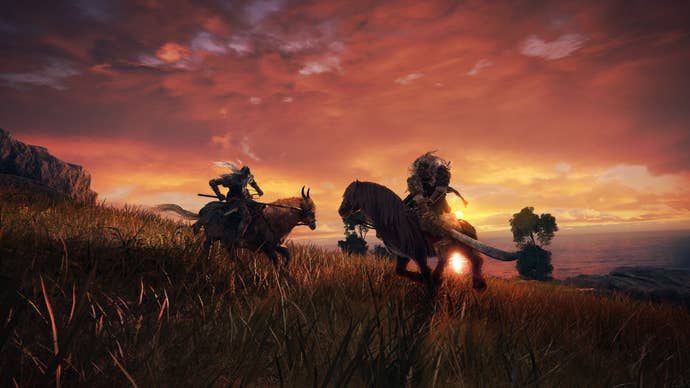
Interviewees also agree that a lack of communication between FromSoftware and its community is an issue. Dark Souls 3, for example, has not received balancing updates since 2017. “Players have complained about the netcode [and] connection issues of the game for a long time, but I think a lack of coherent communication directly with the developers is why these issues have remained,” Amir says.
Gabri co-created the Champion’s Ashes mod as a DIY approach to overhauling PvP, limiting its availability to banned players to prevent crossover with ‘vanilla’ PvP. Additions include a feint mechanic, allowing players to cancel certain attacks for mix-ups, alongside new animations and weapons. “Now a lot of players like to play Ashes-only PvP instead of vanilla Dark Souls 3,” Gabri says. “We wouldn’t have done it if they were updating the game normally: we wouldn’t have needed to do it. Hopefully, [FromSoftware] can not do that in Elden Ring: instead, they should listen to community feedback. If there is any issues - broken weapons, glitches, anything like that - they should listen to the community.”
The community is taking a proactive approach in this regard for Elden Ring. Jeenine and other PvP-focused YouTubers have compiled various issues and glitches arising from the game’s network test in November, while Gabri authored an extensive and highly-upvoted post exploring these issues on the Elden Ring subreddit. “There is potential for it to be the best PvP of all of the souls games ONLY if it fixes a few glaring issues,” he wrote. “Otherwise, the PvP at its current state isn't ready to be released for the public.”
Overall though, the community and our interviewees are extremely excited. For Amir, Elden Ring represents the culmination of FromSoftware’s prior games, pointing to “extremely innovative” nuances present in mechanics like Ashes of War - special attacks which can be equipped interchangeably between weapons. Jeenine has doubts about the functionality of some new moves like jumping attacks in PvP, as well as concerns regarding how easy it felt to dodge certain abilities, but overall praised the tight controls and expanded weapon movesets, which he feels will give more mix-up options for competitive players. “The depth of the game dramatically increases, just like that,” he explains.
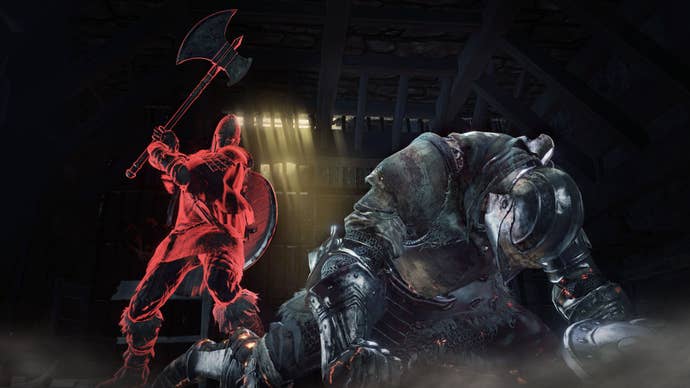
Souls PvP has historically been dominated by light attacks, with heavy attacks used rarely. However, Gabri explains that Elden Ring is “killing the R1 spam” by removing two-hit combos and buffing heavy attacks. “The amount of variety is going to be huge,” he says. “You can have all kinds of playstyles, which is one of the attractive features of Souls PvP.”
Gameplay aside, Elden Ring represents a potential breath of fresh air for the Souls PvP community. Without traditional PvP events being organised by the developers or publishers, the hardcore Souls PvP community has historically been gathered into small groups, leading to tribalism and in-fighting among some players, according to Gabri. For him and Amir, their Discord server represents a chance to cultivate a welcoming space for players as the community expands. “[For] a lot of the issues that the Souls games have - toxicity, egos and all that - we have the right people in charge of this server: adults. People who think ‘this is still a game guys - don’t get too into your head’,” Gabri says.
He even envisages a potential esports structure for competitive PvP with Elden Ring, if its developers can address the historic netcode and balance issues of its back catalogue. “If the devs realise there is a market for it and they wanted to balance the game quite a bit to make it more competitive, to get it to esport [level], why not?” he argues. However, it’s also worth remembering the mechanic that makes online play so special in the Souls series to begin with: invasions. “It's obvious invasions will continue to be bigger [than duelling] due to its unique charm, you really can’t get it anywhere else,” Amir says.
I’m still losing most of my fights, but duelling has sunk its claws back into me. Every time you rise out of the ground in a new world, you rarely know what to expect next: a mage firing soul darts at you while wearing an onion helmet? Someone dual wielding two maces? Or - more often than not, frankly - a heavily armoured knight brandishing a dagger. No matter what, it’s an invitation to lock on and enter a deeply immersive state, each hit landed a triumph and each blow received a disastrous setback.
Here’s to hoping Elden Ring can pull it off in February. And if not? We’ll always have Irithyll.
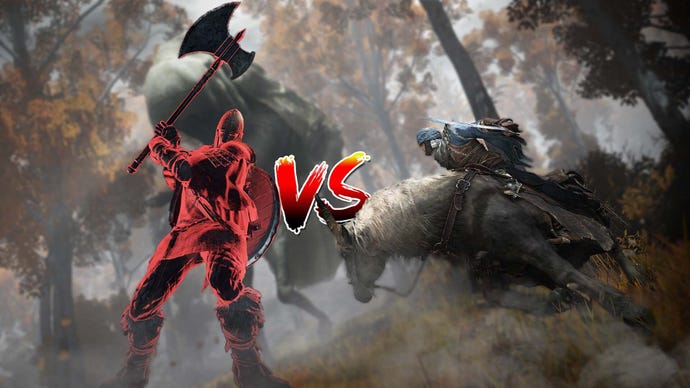




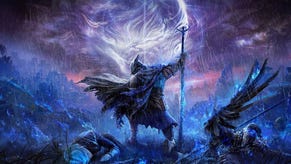



.jpg?width=291&height=164&fit=crop&quality=80&format=jpg&auto=webp)
